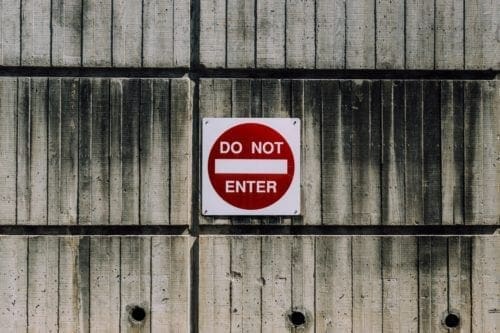Big and strong
Ask me what I remember most about 2019, and I’ll tell you it was the humid night in Spain I spent crying in my aunt’s kitchen.
- 4 years ago
August 28, 2020

WINNIPEG, Canada — Ask me what I remember most about the summer of 2019, and I’ll tell you it was the humid August night in Spain I spent crying in my aunt’s kitchen.
Maybe it was the surprise birthday party my family threw for me, or the three glasses of champagne, or realizing how awful my life at home had become and dreading going back.
My life had become routine starving, counting, weighing, and working out to maintain (what I considered) a “perfect” physique. Three weeks away — this night especially — opened my eyes to how much I hated it.
I broke down and told my aunt about everything: the dieting, the excessive workouts, the fear of fat. I felt a connection with her I didn’t feel with anyone else. Unlike my parents, she understood where I was coming from. She recognized things in me she’d done herself when she was my age. Seeing her now, I never would’ve guessed.
I had become too small, too weak, too obsessive for my own good. I thought I was in control of my life, but body dysmorphia controlled me. After six years, this one night in a different place with the right person made me realize I’d gotten trapped in a lifestyle I’d lost control of years ago.
Winter, 2014
I woke up and dragged my feet to the bathroom. I peed, washed my face, and weighed myself: the morning routine of a 17-year-old girl who didn’t think twice about most things.
Next, I tapped the scale with my foot to wake it up, then stepped on, watching the digital zero move across the screen.
I thought about a few nights ago when I slept over at a friend’s house. We went all-out on the snacks — chips, pizza, Dairy Queen Blizzards. I looked down and saw the zero replaced by another number. My eyes widened.
130.0.
That couldn’t be right. The thing must’ve been broken.
I stepped off and on again, only to see the same number. So I did it again. And again. I kept thinking next time it would show the expected 118.0 and my nausea would go away. It didn’t.
I was huge
I was disgusted with myself, feeling that I was huge, gross, and fat. Why did I eat all that stuff?
I desperately tried to process the number at my feet but I couldn’t and wouldn’t accept it. So I decided something needed to change. I needed to start eating better — less, obviously — and work out more. That’s how people lose weight.
When I was a kid, my parents always said I was a perfectionist. I thought that was a good thing. Perfect things had nothing wrong with them. I cared so much about being perfect at everything that I’d throw a fit if I wasn’t.
I was an active kid. When I was four, I started doing rhythmic gymnastics, and 18 years later, I still haven’t stopped.
When I was 10, I had a six-pack and well-defined shoulders. My dad loved showing me off to family and friends, getting me to show my stomach and cough (I couldn’t flex on command) so they could marvel at his lean, muscular daughter.
Dad was super fit
I always wanted to be just like my dad. He was super fit and still is. Every night he went downstairs to work out in the home gym he built, and sometimes if I was lucky, he let me “work out” with him. I wanted to be big and strong, too.
I remember when I first noticed my dad pinch at his stomach when I was maybe seven or eight and we were standing in the kitchen. He grabbed the skin on his abs between two fingers and said, “I just can’t get rid of this and stay lean!” I could still see a defined six-pack; he looked pretty lean to me.
Soon enough, I started doing it too, in comparison. Whenever he did it, I’d do it back and say, “What are you talking about? Look at me!”
“You have nothing there!” he’d say.
He never saw what I did, so I let it be.
I don’t think he realized his attitude towards himself would affect me. He wasn’t malicious and he never made negative comments about my appearance, because he knew better than to do that to his daughter. I asked him about all this a few months ago, and he said anything I did to myself was my own fault. The thought of his attitude and actions affecting me never crossed his mind.
The environment we grow up in becomes our norm. For me, that was a fear of having fat.

Spain, 2019
Spain is insanely humid in mid-August, which only made the ice cream cake on the kitchen table melt faster. We’d forgotten about it and started playing the oldies, making my aunt’s kitchen our private discotheque. I walked over to see if there was any part of the cake I could sneak a bite of. I knew how to be quick and careful.
“Just eat it! It’s going in the garbage anyway!” my aunt said.
I couldn’t “just eat it.” “Just eating” was how I’d gotten so big in the first place. I was still afraid that overeating once would bring back years of lost weight. She reminded me we were making memories and living life, not being hung up on aesthetics and calories. She pointed to her underarms, and then her butt. “Everything goes eventually!” she said. She’s right: if there’s one thing I can’t control, it’s nature.
She sat down and planted her forearms on the table, leaning toward me with a sense of urgency.
“Samantha. Strong is here,” she said firmly, pointing to her brain. Then she pointed at her bicep. “Not here.”
2015
It wasn’t long after my initial weigh-in at 130 pounds that I started taking serious control of my diet to help ease my appearance-related anxieties.
I started tracking my calories and macronutrients — fat, carbohydrates, and protein — by the gram, and I used online calculators to figure out what I should be eating to reach my goal as bodybuilders do. After all, I couldn’t wait to look like one.
But I wasn’t tracking to ensure I hit the right numbers, though. I tracked to keep them as low as possible, except for protein — I ate tons of that. Extra carbs become fat, and protein builds muscle. I knew what to do.
I bought a food scale to measure exactly what I was eating. Measuring cups wouldn’t cut it anymore. The scale gave me a sense of control and comfort. I loved it so much I developed a dependency on it and I used it for almost everything I ate. If the battery died and I didn’t have new ones I freaked out. Plus I got mad if it started acting up, giving me faulty numbers. I couldn’t eat if I didn’t know exactly what I was eating. The thought alone made me anxious.
Weigh chicken. Too much. Take some off. 130 grams. Perfect. Add to the meal. Weigh baby carrots. 62 grams. No, I planned for 60. Take some off, try new ones. 61 grams. Try again. 62, 63, 60 — there. Add.
Fed up
My mom quickly got fed up with my new habit.
“Why does everything have to be perfect?” or “Why does it take you so long to make food?” and “Why can’t you just eat what I make anymore?” she’d complain. I couldn’t explain it in a way she’d understand. My mom’s favorite snacks are Froot Loops and bread. She couldn’t understand that I was scared of gaining back every pound I lost if I ate one gram too many carbs. Nor did she overanalyze what she ate or see food as nourishment and something to be enjoyed.
To build muscle (a form of weight gain), you have to eat more calories than you burn. I was more concerned with losing fat. I knew this wouldn’t show up on a scale, so I stopped weighing myself. Instead, I started measuring progress by how I felt and looked in the mirror believing I could eat in a deficit, lose weight, and still put on muscle if I worked out hard and long enough. I thought I knew what I was doing.
She tried her best
My mom tried her best to help me, suggesting the best ideas she had based on what she knew at the time, like seeing a dietician or talking to a counselor. I got mad at her for getting involved and said I’d take care of it myself.
The best way to understand a person’s struggle is to experience it yourself, but my mom never looked at herself through a lens like I did. She only saw the outer behaviors and results. Seeing a dietitian wouldn’t cure my anxieties, and talking to a counselor couldn’t make my brain see food as food again.
When I turned 18, she took me to get a gym membership. She later explained she hoped working out would make me feel better about myself, burn more calories, and therefore, eat. At the time, I saw working out as burning extra calories, so if I ate the same amount, I’d lose fat faster but build the muscle I wanted. It was my perfect solution.
Hours in the gym
I spent hours in the gym doing cardio and weightlifting, usually feeling faint by the end. I thought I was just giving it my all, so I didn’t tell anyone. No one had to worry. I knew what I was doing.
Also, I was still highly invested in gymnastics, spending five hours practicing on Sundays. I ate 800–1,000 calories those days and was likely burning about 1,800. I began to lose strength, and people noticed. Maybe if I had passed out, I would’ve realized what I was doing. In 2016, I was 96 pounds, eating 1,000 calories a day. The recommended amount for weight loss is no less than 1,200, or your body can develop vitamin deficiencies and metabolic damage. In 2020, I’m 110 pounds, eating 1,500–1,800 calories a day. That’s just enough to maintain my weight. My lingering fears of eating too much still overpower my desire to gain even more weight.
I developed intense body dysmorphia and fear of fat within my first year of weight loss. When I stopped weighing myself, I became severely invested in my reflection: where I carried fat, the size of my thighs and how defined my muscles were.
Every night before bed I stared at and analyzed my reflection in my full-length bedroom mirror. I put my feet together and leaned forward, looking for a thigh gap. Next, I turned sideways and fixed my posture, looking for a flat stomach. Finally, I measured how much fat there was under my butt with my fingers — two, three, 15 times each side.It didn’t matter how tired or annoyed I was; I went as long as I needed to ease my worries. After about 30 minutes, on a good night, I finally let myself go to sleep.
If I did the math, I’d say I’ve spent days — weeks — picking myself apart in the mirror. That doesn’t even include quick checks in hallway mirrors, bathroom mirrors, windows, and anything else that reminded me of what I looked like.
I looked to relieve the anxieties I felt about my appearance. I felt anxious when I didn’t look, and although looking stressed me out, it made me feel better. It’s like an itch you know you shouldn’t scratch, but you can’t stop and don’t want to, because even temporary relief is better than nothing.
‘What are you doing?’
I always checked as secretly as possible. My bedroom door was never closed unless I was changing, hiding gifts from my family, or checking my body. Sometimes before bed, I’d hear my mom ask through the door, “What are you doing?” in that accusing tone mothers have when you’ve been caught doing something you both know is wrong. I couldn’t say anything that would throw her off. She knew what I was doing.
Any time I ate out and couldn’t get to a mirror, I’d anxiously look down at my stomach.
Suck in. Pull up my pants. Hide anything that folded over my waistband.
After big family meals, especially with dessert, I’d head to the bathroom to check what I looked like. I had to make sure I hadn’t gotten fatter in the 20 minutes since I ate all the turkey, stuffing, potatoes, Nanaimo bars, and pie my stomach could hold.
Suck in. Ab check. Relax, relieved. Still there, somewhat. Good.
Turn to the side. Check butt. No major change. Good.
Leave, hoping I wasn’t gone long enough for people to suspect what I was doing.
In 2015, I stopped getting my period because I didn’t weigh enough for my body to maintain itself. My mom picked up on it after about a year of not seeing products in our bathroom garbage. She asked me if I’d been “getting it,” which of course, I said no. I couldn’t fake or hide that. She immediately took me to my doctor, who recommended me to an endocrinologist. I knew I did it to myself; it was because of my weight, and I wasn’t concerned.
‘I don’t want to see it’
I spent three of the longest hours of my life with my mom in a waiting room to see the endocrinologist on a January evening in 2016. When the receptionist finally brought us to the exam room, she told me to weigh myself to save time when the doctor arrived. I hadn’t stepped on a scale in a year and I had no idea what it would say. Then I felt knots forming in my gut.
I took my shoes off and stepped on the scale, but turned my head away. “You look and write it down,” I told my mom. “I don’t want to see it.”
Hearing her voice is still one of the clearest memories I have from those years.
“You’re dying,” she said, helplessness in her voice.
Any normal person would probably freak out if their mom told them they were dying. I didn’t. I stepped off and asked her what it said, thinking she was overreacting. She showed me what she wrote.
104.0
I didn’t believe her. I stepped on the scale again and looked. 104.0.
I hadn’t realized I’d lost that much. While I was shocked I was not worried and weirdly I was almost happy to see it, as it’s what I was working so hard for.
I found out that evening that I could become infertile if I didn’t get my period, and I had serious vitamin deficiencies. The doctor told me to start taking Vitamin B12 supplements and gave me a prescription for 50,000 IU of Vitamin D. The average recommended Vitamin D intake for adults is 400–800 IU; 4000 IU being a safe maximum intake without consulting a doctor. I’m still taking it.
I began to realize I wasn’t putting on muscle as I’d planned. I’d been lifting the same weight for weeks and was only getting smaller and leaner. I got frustrated but wouldn’t do what I knew I needed to do to change it — eat more and run less. I wanted to be strong, but not big, like before. “Big” was a terrifying thought. “Big” was what I’d worked so hard to not be.
I’d rejected everyone’s advice and kept losing weight. By late 2016, I’d hit my all-time low: 94 pounds. I had no more self-esteem or satisfaction than when I was 130 pounds.

I saw a quote one day that I keep on a typed note on my laptop: “TRYING TO FIT A ZERO IS TRYING TO BE NOTHING.” I tried so hard to become as small as I could, and it didn’t feel as great as I hoped. What started as a weight-loss goal became an obsession with being small. I never saw my friends because all they wanted to do was eat out, and I couldn’t handle eating anything I didn’t know the exact macros for. I ate as little as possible for days after binging at family dinners. Shopping was hard, not because I didn’t like how I looked, but because I was too small to fit a size extra-small.
This past November, I was excited when I put on an old pair of size three jeans and they almost fit my thighs again.
Spain, 2019
The necklace my aunt gave me as a birthday gift still hangs around my neck. It was a small gold disk with a star engraved in it and one small rhinestone in the middle.Recovery is hard. When I think about falling back into old habits, I put my hand over it and think about my aunt and I wear it every day, especially if I’m going out to eat.
After that humid night in my aunt’s kitchen, the thought of going back to that life of obsession and perfectionism tortured me because I’d experienced so much on my trip. Falling into that trap again was like being given a taste of freedom but choosing jail instead.
My aunt said, “Do not be a prisoner in your own body.”
I saw the miserable life I’d become trapped in clearly for the first time in that stark white, IKEA-furnished kitchen in a small village in Spain. I cried. I’d been sabotaging myself the whole time.
Personal jail
My body had become my personal jail. Some days I gave myself a bit of freedom, eating more than my macros allowed or taking a day off from the gym, but I always fell back into weighing myself and mirror checks and guilty workouts. I could see the life I really wanted and needed and I knew where I could be, but I refused to do what I needed to get there and I was afraid of letting go of what I knew, of losing control.
Three words my aunt said gave me all the hope I needed: “You will arrive.”
“Arrive” sounds sophisticated to me, but it was just right coming from my aunt. “You’ll get there” wouldn’t have the same effect.
When you’ve been living a certain way for so many years, change isn’t easy, quick, or linear. It’s harder when you can’t see how destructive and consuming your habits are. It’s not that I chose to ignore it; I couldn’t see in the mirror what everyone else saw in front of their eyes.
My mom saw her daughter deteriorate, but I saw a girl with too much fat under her butt.
My dad saw his daughter still in control, but I saw a girl controlled by an obsessive lifestyle.
Looking back at photos from those years today, I see a girl who was miserable, insecure, and underweight. The veins she thought were cool were signs of deterioration. The butt she thought she had was a pancake. No wonder she felt tired and cold all the time; her metabolism was slowing down. Why couldn’t I see those things while they were happening?
I have the same set of eyes now that I did then, don’t I?
There are days I think I’m on my way to recovering, and days I feel like I’ve regressed to my old self. It’s a mental battle that skewed my sense of self and of the world. It’s hard to understand unless you’ve lived it, too. The only person that could really help me was my aunt, no matter how hard my mom tried, and no matter what my dad thought.
I have not yet arrived, not fully, but I tell myself I will.That night with my aunt was crucial for me to finally see the life I could have, and I don’t have to spend hours in a gym or perfectly count calories to get there. I want it more than I want perfection and control.
I know I will arrive.




















































































































































































